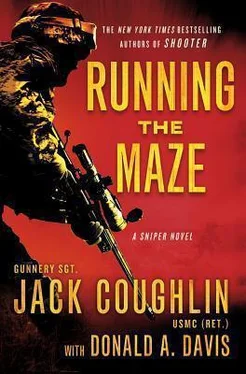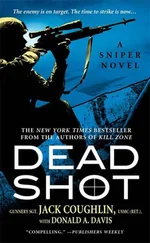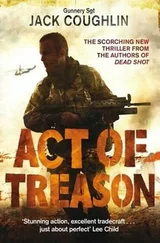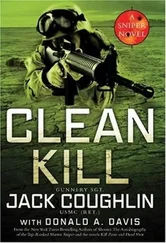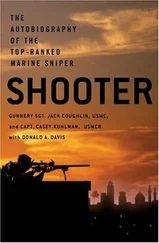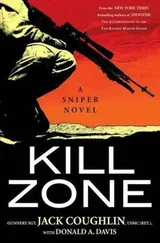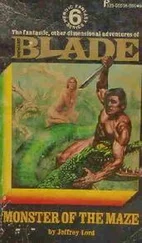As Sir Jeff started to get up, a leg muscle tightened in spasm and a flash of pain was painted on his face. He sat back down. “Go on, Kyle. I’ll see you when you get back. Take care of that girl.”
* * *
WHERE ARE THEY? UNDERSECRETARY Curtis rolled the thick glass in his hand, and good Scotch whisky swirled with the ice cubes. Beth Ledford and her Marine sidekick had disappeared so thoroughly that nothing was showing up in the databases. The need to find and dispose of both of them had increased, because they were not giving up. Maybe they were just hunkered down in some safe house on the outskirts of Billings or Tampa, waiting for the storm to clear. Curtis could not afford such a wait. He drank deeply, walked to the standing bar, refilled his glass, and resumed pacing the living room, half-watching a television documentary about the space vessel America, the first ship of a series that would eventually land astronauts on Mars. He paid little attention, for he already knew the rocket would never reach orbit; it would travel more than a hundred thousand feet straight up, then boom, and another space catastrophe would invade the placid worlds of television watchers.
Curtis still burned about being lectured by the director of the Diplomatic Security Service, who had snapped and threatened consequences if Curtis ever again attempted to use the DSS for his own purposes. Curtis had kept calm during the tirade, although his stomach had churned. Prison? Abuse of power? The man carried a pistol in a shoulder holster and made certain that Curtis had seen it.
Bill Curtis had carefully explained that he had acted fully within the law, as stated in the Patriot Act, and in his official capacity. Any citizen could be investigated on a whiff of suspicion of terrorist activity. No proof was needed. Beth Ledford had been acting very suspiciously, even disobeying direct orders in a politically charged situation that fell within the interests of the Bureau of American-Islamic Affairs. Her interference could further impede the already weak diplomatic relations with Pakistan.
That grain of truth had saved him, along with a contrite admission that he had overstepped his authority by ordering the full surveillance of the Coast Guard woman. Curtis promised never to do so again. The DSS man had not wanted the involvement of his own office exposed any further and chose to drop the matter. The book was closed with the security service, and Curtis would not reopen it. It was well that the man had not known the other half of the story.
He had arranged for the DSS only to track Ledford around the Washington area. For the direct attacks on Swanson and at Quantico, Curtis had turned to his contacts within a renegade element of the private security community, but the mercenaries had failed, and two of them had been killed. After that, the private firm was no longer interested in the job, no matter what the pay.
Curtis drank the sharp whisky and felt the burn go down into his stomach. So am I alone in this now? No. I have powerful friends all over the Middle East, many more than the U.S. government knew, and those friends have friends in the United States. Some would be more than willing to help track down this loose end. Unsaid was that Curtis, as the head of the BAIA, had granted favors before, and would do so again. No. All was not lost. This was just a temporary setback, and he would never be alone.
He emptied the glass, washed it in the sink, and set it on a towel to dry.
Curtis climbed into bed, turned out the light, and again weighed the entwined issues carefully: revenge against the possible charge of treason, and protecting the most wanted man in the world.
Before turning off the light, he picked up a framed colored photograph from his nightstand and set it up on a pillow beside him, as if the paper images could look back at him, maybe even talk. It showed a beautiful, young Iraqi woman with flowing ebony hair and penetrating eyes, clad in ski clothes and seated in a comfortable chair beside a roaring fire in a lodge in Aspen, Colorado. At her feet was a grinning boy who had inherited his mother’s good looks. He was missing a tooth. Bill Curtis had taken the photograph while the family was celebrating the child’s fifth birthday. He drifted off to sleep with the picture still propped up beside him.
Curtis had met Raneen at a garden party in Baghdad in the old days, when he was running an oil exploration operation for the Iraqi government and spent a lot of time there. Life had been quiet and enjoyable in the big polyglot city during those times, because Saddam Hussein kept religious extremists on a tight leash. Raneen was the daughter of one of the dictator’s reluctant generals, a professional soldier, and it took Curtis months of careful maneuvering to win the family over enough that he could marry his dark-eyed beauty. A year later, they had a child, a boy, and they named him named Cane. Life was golden, and stayed that way until 1990, when that fool Hussein decided to invade Kuwait.
Curtis was in Taiwan on business, and his family was visiting the grandparents in Baghdad. They were caught on opposite sides of a sudden and vicious war, and for the first time, Raneen and Cane were beyond his reach. When American bombs struck Baghdad, one landed squarely on the general’s home, killing the entire family, including both Raneen and their son. The picture on the pillow was all that was left, and Bill Curtis cherished it.
THE BRIDGE
THE SEARCH OF THE wide valley below the bridge did not find the madman who had single-handedly wiped out the entire patrol of Taliban fighters, leaving four men dead and two more wounded. Only the ISI soldier who led the group had escaped the attack unharmed.
Sergeant Hafiz had taken command and organized the hunt all the way down to the fallen steel bridge, clearing it grid square by grid square on his map, but found nothing. He was disgusted with the Taliban. Not only were they poor soldiers, but after learning what happened to their comrades, some of the others were spreading a story of how an evil monster that dwelled in the darkness was chasing them. Hafiz would never be able to trust them. Real troops were needed to secure the area so he could send these mountain men back to their rocky wastelands. He sent out a replacement patrol but desperately wanted regulars here, now.
As dawn approached, a cleaning worker found Chief Engineer Mohammad al-Attas sound asleep in the bed of his underground apartment, still wearing the bloodstained clothes from his night of rampage. Sergeant Hafiz brought in three other large men and slapped al-Attas hard across the face, snapping his head to one side. The engineer awoke to a streak of pain, a scream ripping from his throat as he was snatched from the bed and roughly carried back to the infirmary, where he was lashed again to the metal rails of a bed with thick restraints.
“What are you doing to me? What is happening?” he yelled. The men left the medical center, and Hafiz appeared. “Sergeant… What is going on? Why am I being treated like this?”
Hafiz brought a chair forward and sat beside him, quietly studying him as if trying to see who was really inside the shell of flesh and bone. The face and other exposed areas were all covered in dried mud, which stuck in clumps between the toes and proved he was the Djinn. The eyes, however, were startlingly clear and free of guile, indicating that he was also the engineer. The split between the two personalities was sharp and complete. “Who are you?” the sergeant asked in a conversational tone.
“You know very well: Chief Engineer Mohammad al-Attas. Let me go. I demand that you set me free and explain yourself.”
“I’m afraid that is not possible right now. Where were you last night? What did you do?”
Читать дальше
